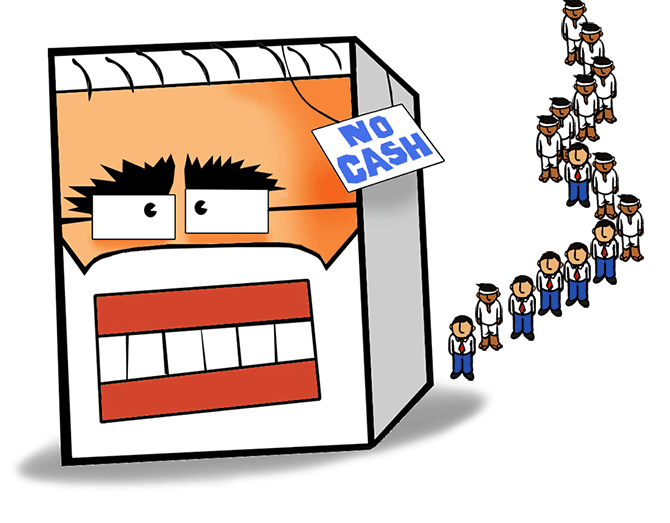 | « Back to article | Print this article |
Kanika Datta reflects on Indians and our relationship with snaking queues from the license raj to demonetisation.
Illustration: Dominic Xavier/Rediff.com

Prime Minister Narendra Modi has promised the long-suffering citizens of India -- or, at any rate, those in Moradabad, Uttar Pradesh, the state next up for Assembly elections -- that the queue for cash would be the last line in which they would ever stand. Governments in the past had made them stand in line for rice, sugar, kerosene, he added; he, Narendra Modi, would end all that.
Do give Mr Modi full marks for chutzpah, considering that the snaking queues at teller counters have made a big-time comeback after yonks and the ones at ATMs are a whole new phenomenon created by this one act, so ill-planned as to appear capricious.
Obviously, the prime minister does not expect obtuse and literal-minded citizens to take such soaring rhetoric at face value. Even if India were to become the magical digital paradise of his admirable vision, he knows as much as the next person that queues are endemic to the Indian experience, more so in the absence of wide-ranging institutional reform that are, to be fair, beyond the capacities of one regime. Even if the lines at public distribution outlets for weevil-ridden rice and wheat and stony sugar vanish, thousands of Indians will continue to patiently line up every day for jobs, wages, water, medical care, railway tickets, and so on.
Given Mr Modi's astute observation of chronic Indian bad habits and his manful efforts to reform them, you would think he would approach the queue question differently. Consider how his concern for reluctant toilet usage morphed into Swachh Bharat; poor standards of physical fitness into International Day of Yoga; and the regrettable public propensity for cash into demonetisation. How about starting an Akhil Bharatiya Queue Anusashan Divas to inculcate in Indians the most basic discipline involved in standing in line?
The inability of the average Indian to queue in an orderly manner is one of Incredible India's abiding mysteries, one that puts all denizens of this most unequal of countries on a par. From the humble ration shop or free clinic to the snazziest airport and movie hall, the queue is where Indians reveal their true selves like nothing else.
For instance, space is something that comes at a premium in a country with 1.2 billion people (surprisingly, India, comes 33rd in world population density rankings but is preceded mostly by island nations, the Vatican or hotspots SUCH AS Palestine and Israel). In the queue, this constraint manifests itself in the unfailing Velcro properties of the person standing behind you.
Since this quality is also displayed in less savoury ways, the sexes are strictly segregated -- outside of the Islamic nations, separate men's and ladies' queues are almost unique to India. And since Indian queues are inherently unruly beasts, we have the senior citizens' line too, one compelling reason for Indians to welcome their 60th birthdays.
Queueing in India owes its provenance to the bad old days of the licence-permit raj with all its policy-induced shortages of basic resources. That era may be a thing of the past, but the culture of subornment and corruption that it bequeathed lives on in the visceral Indian art of queue-jumping, even in circumstances of plenty. Mostly it's because the queue-jumper knows somebody to warrant preferential treatment. Almost as often she harbours a flexible notion of the queue, assuming that the exercise demands active intervention in the form of sharp elbows or a fleet foot to make it to the front of the line.
Interestingly, the culture of scarcity that accounts for absent queue discipline in India is precisely why queues in Europe are so innately disciplined, even today. Outside of the soup kitchens, large queues for necessities first emerged as a result of the world wars and, not unlike the demonetisation exercise in India, citizens took a particular patriotic pride in doing their bit for their country, or so they believed, by accepting starvation-level rations.
Long after the wars, queues lived on in the Soviet Union, where people could come back empty-handed after hours of waiting. Yet, denizens of that former economic bloc rarely demonstrated the same indiscipline as the average Indian.
The queues of the past month have proven exceptional in terms of relative discipline, tolerance and camaraderie in the face of a manifest shortage. For this, bank staff and the cooler weather must get equal credit. From the evidence of the queues, it is also striking how demonetisation has changed the public narrative of this regime from an overt majoritarian agenda to a question of class.
Will this influence the upcoming state elections? Ironically, another set of queues will yield the first answers -- those at the hustings in UP in early 2017.